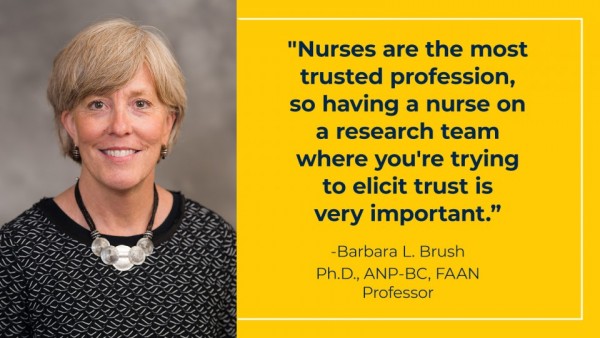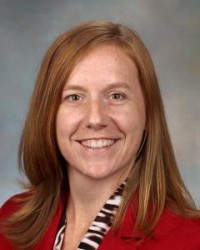U-M Nursing faculty partner with Henry Ford to bring a community approach to cancer research
Community engagement isn’t common practice in cancer research. When the Henry Ford Cancer Institute wanted to connect with their Detroit community on research to dramatically improve the representation of African Americans and other minorities in cancer clinical trials, they turned to experts at the University of Michigan, including leading nurse scientists from the School of Nursing.
Professor Barbara L. Brush, Ph.D., ANP-BC, FAAN, is the co-principal investigator on the Participatory Action for Access to Clinical Trials (PAACT) project, a community-based research initiative supported by a $750,000 grant from the biotechnology company Genentech that will address various barriers to trust and participation in clinical trials in collaboration with the Detroit Community-Academic Urban Research Center (Detroit URC).
Brush, who serves on the Detroit URC board of directors, is a leader in community based participatory research (CBPR), which engages community stakeholders as co-collaborators in all steps of the research process. Throughout her career, Brush has used a CBPR approach to study social factors that contribute to health, with a particular focus on how they contribute to health disparities in Detroit.
The PAACT project has brought together a multidisciplinary team of more than 25 researchers and Detroit-based community partners to focus on clinical trials involving breast, colorectal, lung and prostate cancers, which have higher mortality rates for African Americans when compared to other racial and ethnic groups. The grant, which runs through winter 2022, will support the development of strategies to increase the enrollment and retention of African Americans in clinical trials related to these four types of cancers.

Brush is working with U-M School of Public Health Professor and Director of the Detroit URC Barbara A. Israel, Dr.P.H., to guide Henry Ford’s cancer researchers through an approach that is unfamiliar in their field.
“Most of us in the Detroit URC have been engaged in CBPR for a long time, but it's relatively new in the cancer field,” Brush said. “We are seeing more and more community engaged approaches in all kinds of research, because we're realizing if the community is engaged in the development of interventions, then they are more willing to accept them.”
 Community engagement begins with the PAACT steering committee, comprised of eight community organizations based throughout Detroit, including neighborhood and religious organizations, cancer support groups as well as agencies that serve the city’s Caribbean and African populations.
Community engagement begins with the PAACT steering committee, comprised of eight community organizations based throughout Detroit, including neighborhood and religious organizations, cancer support groups as well as agencies that serve the city’s Caribbean and African populations.
Brush and Assistant Professor Noël Arring, DNP, Ph.D., RN, OCN, are working closely with the steering committee to discuss their preliminary findings from an exhaustive literature review of more than 1,500 publications. Arring, a nurse scientist who focuses on cancer care delivery, is leading efforts to gather the committee’s feedback and ensure community perspectives are part of the review process and analysis.
“This type of power sharing and collective decision-making is not typical for most researchers,” said Brush. “It's very time consuming, but we hope that taking this time up front will lead to a sustainable intervention that actually works.”
Close collaboration with the steering committee during the review process will help create the framework for the project’s next phase: interviews and focus groups with cancer survivors, patients and health care providers.
“We want to know what it would take,” Brush explained. “What would make people agree to be part of these trials? There’s a lot of stress in the community, and we know we haven't done well locally or nationally, so what would help people trust us enough to do this?”
Building trust is why nurses like Brush and Arring are crucial to effective community-based science. Brush is also a nurse practitioner at a neighborhood health clinic in Ypsilanti, Michigan, and understands that nurses’ perspectives bring a distinct dimension to this kind of work.
“Nurses are the most trusted profession, so having a nurse on a research team where you're trying to elicit trust is very important,” she said. “Nurses in particular are well prepared to provide education, to understand the patient and not just the disease. We take care of people with cancer, we're not taking care of cancer. We look holistically at the complexity of the person in their environment. And because we do that, I think we’re more comfortable with certain conversations and we're able to help people navigate their lives.”





